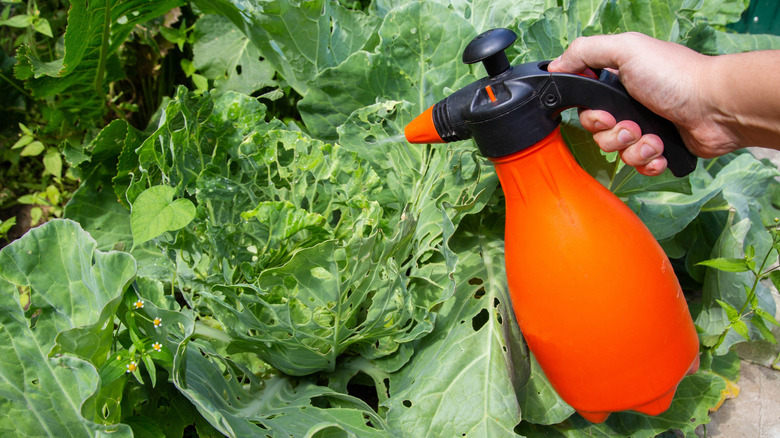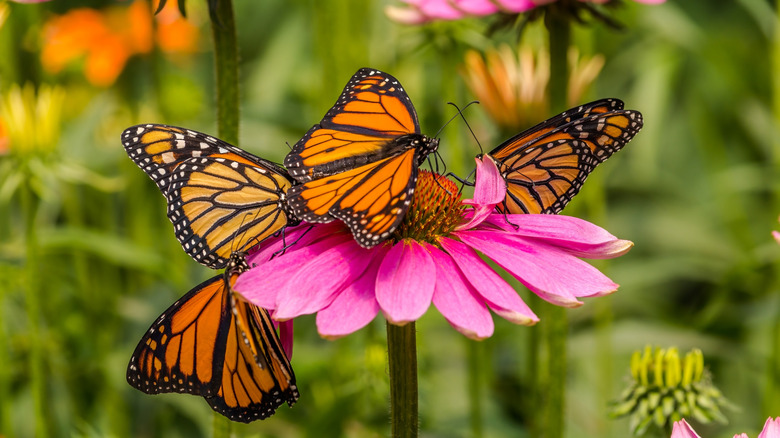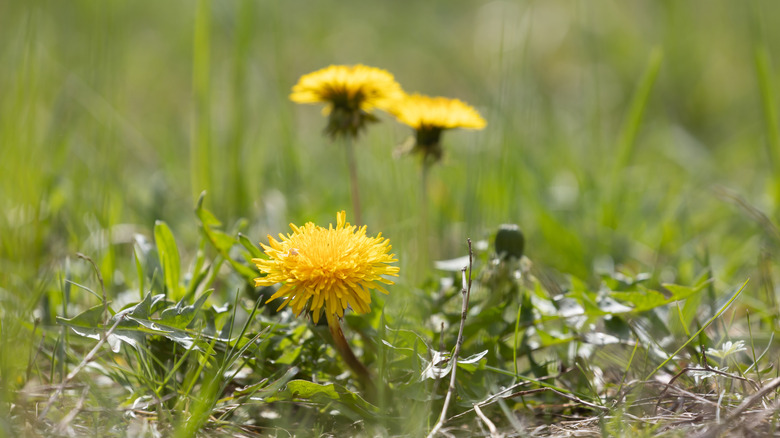Why You Should Avoid Using Vinegar To Kill Weeds In Your Garden
Not all weeds are created equal. Weeds are broadly defined as any plant growing where you don't want them to be, whether because they're unattractive or cause problems for surrounding growths. For example, white clover is considered a weed in many lawns despite the fact it's a ground cover that can help reduce soil erosion while supplying additional nitrogen. But many weeds will outcompete the plants you actually want to grow in your garden, taking up additional space or nutrient resources in a way that stunts other crops and flowers.
Herbicides should be considered a last resort for dealing with weeds, and you should err on the side of natural, less-toxic options made from plants such as lemongrass. Horticultural vinegar is often used as an alternative weed killer, but its high concentration of acetic acid can also be damaging to people, native animals, and plant life alike.
There is a major difference between the kind of household vinegar you're buying for your kitchen versus horticultural vinegar: The vinegar you consume has around 5% acetic acid, whereas any herbicidal variety can have upwards of 20%. Horticultural vinegar can irritate your skin and even permanently damage your eyes. Vapors from acetic acid alone can irritate your throat or lungs. Moreover, another big downside to using vinegar in your garden is that it can harm beneficial pollinators such as butterflies.
Butterflies and other pollinators are susceptible to strong vinegar solutions
Using vinegar solutions is a common suggestion for cleaning hummingbird feeders, which are visited by other pollinators such as butterflies and bees. However, homemade pesticides utilizing ingredients such as vinegar can be ineffective at handling your intended targets, or at their most potent may indiscriminately kill all of the bugs in your garden (as opposed to commercial pesticides that are typically designed to target specific pests). Pesticide-strength vinegar with 20% acetic acid could harm a butterfly's fragile wings, and tests have shown that butterfly eggs treated with vinegar hatch at a reduced rate of 35% to 72%.
Anything above 10% acetic acid could have a toxic effect on honey bees and other pollinators, according to the Xerces Society for Invertebrate Conservation. Home remedies for pest control can be especially dangerous because they include no instructions for dilution or use rates, so even if a little bit were safe to use around butterflies, there's no telling how much acetic acid you're applying with any given mixture of horticultural vinegar used to fight weeds. Of course, butterflies and other pollinators aren't the only things that might be affected. Vinegar can still cause irritation and permanent eye damage if you aren't careful. Be sure you at least use protective equipment, including gloves, while working out in your garden—especially if you're resorting to more potent weed killers.
Vinegar can hurt your garden without eliminating weeds
Vinegar will almost always be a better option than the world's most common herbicide chemical, glyphosate, which has faced decades of criticism for its toxic effects on the nervous system and lingering presence in the environment, seeping into around 80% of tested streams and rivers in the U.S. While vinegar is less dangerous, you still need to be careful with it.
Acetic acid is a non-selective herbicide, which means it will injure or kill any plant it comes into contact with. It will quickly burn a plant, especially in bright sunlight, and is particularly effective against broadleaf weeds such as dandelion and morning-glory. While it quickly breaks down and leaves no residue, vinegar's non-selective nature means you're just as likely to damage the plants you want.
There are some good reasons why you should try to use vinegar in your garden, it's an effective ant repellant and de-ruster for tools and patio furniture. But for all the potential damage that vinegar can cause in your garden, it isn't a good long-term weed killer. Vinegar does not travel throughout a plant, which means it will not kill the literal root of the problem. Leaving even a tiny segment of root behind will give weeds the opportunity to regrow, and it will be problematic if those weeds grow enough to start developing seeds which are even harder to cull from your garden.


